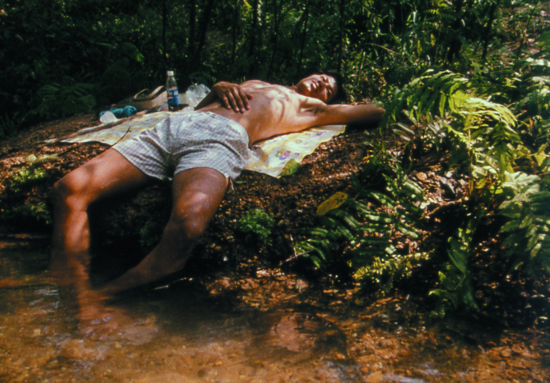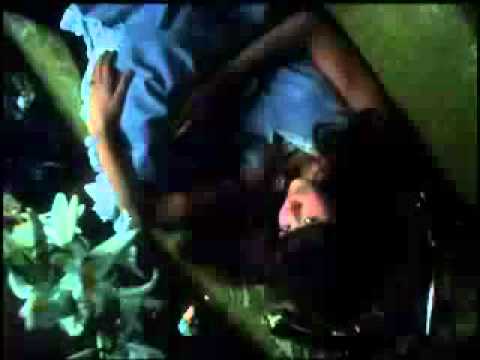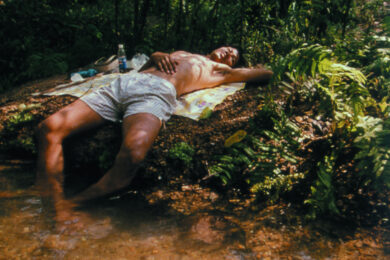Whether it’s a Mute or a Motown, you know where you stand with certain record labels. They come with a particular sound or style, a particular essence, a particular cachet. Only the most studious of collectors will rush out and pick up every single release, yet their very name has the potential to sway your interest. A similar idea has been driving a handful of DVD companies in recent years, each of them hoping to attain the same kind of recognition. Rather than checking out band x because they’re on label y, it’s become a case of taking a punt on film x because it’s been picked up by label y. For the perfect example look no further than Oscilloscope Laboratories, the US company headed up by Adam Yauch of the Beastie Boys. As with the band’s now-defunct record label Grand Royal, their roster is an eclectic one, dictated by personal taste and a firm belief in the individual quality of those titles chosen for distribution.
It’s a labour of love, in other words, not some commercial enterprise. Oscilloscope’s back catalogue takes in everything from a Le Tigre concert movie to a Finnish horror-fantasy about the true, child-punishing face of Santa Claus. And the reason it does so, you feel, is simply because Yauch wishes to extend his own enthusiasm for these films by giving us the opportunity to see them. We may not have a similar celebrity-fronted venture here in the UK, yet the ethos is undoubtedly present and correct. It’s there in a label such as Masters of Cinema, whose tiny team of enthusiasts offer up an auteur-driven, internationalist take on great filmmaking and treat each and every one of their releases with the utmost passion and respect. It’s there too in the British Film Institute‘s continuing reappraisal of our national cinema, one which rightfully encompasses everything from industrial documentaries to the London-shot horror flicks of low-budget US director Andy Milligan. We may not always have prior knowledge of these films, but that passion proves infectious.
Alongside them we have a third deserving of a special mention. In fact, it’s arguably the most deserving of the three. Second Run combines Masters of Cinema’s small-scale operation with riskier choices of the sort the BFI now make on a regular basis. The line-up announced at the label’s launch in 2005 was an immediately enticing prospect. As London-based founder Mehelli Modi stated: "Each Second Run film is our personal selection reflecting significant films which we love and care about, and which we believe should be seen by others for their quality and importance." These were the kind of titles cinephiles always hoped would emerge onto disc, but had little actual expectation of them ever doing so. Such classics of US independent cinema as Shirley Clarke’s black hustler conversation piece Portrait Of Jason and Jim McBride’s still remarkable faux-doc David Holzman’s Diary (both from 1967) rubbed shoulders with Eastern European gems that had remained mostly unseen since their initial, brief and London-centric theatrical runs.
The initial impression was that Second Run would be an on-disc repertory house (re)acquainting audiences with forgotten cinematic greats on a regular basis. The heavy Eastern European focus continued, resulting in names such as Zoltán Huszárik being a little more familiar than they were just a few years back, or the works of Miklós Jancsó being much more accessible than they ever had been. These efforts to highlight and resurrect the classic cinema of Czechoslovakia, Hungary and Poland attracted a great deal of attention from the discerning film fan, not to mention deserved plaudits, but they told only part of the story. While we were discovering masterpieces that had remained practically unheard of in the West – Huszárik’s Szindbád (1971) and Frantisek Vlácil’s Marketa Lazarová (1967) spring to mind – and welcoming wonderful editions of the more cult-ish titles in their catalogue, such as Vera Chytilová’s Daisies (1966) and Jaromil Jires’ Valerie And Her Week of Wonders (1970), Second Run had also been siphoning off some of the finest in contemporary world cinema.
Now we’re as likely to see the release of a 21st century production from the label as we are an Eastern European title from yesteryear. Yet with the latter holding a greater sway among the critics and the cinephiles, these modern selections face the risk of getting lost. It’s an understandable situation to a degree – new movies arrive on disc and in cinemas all the time, but it’s not every day that a hitherto forgotten masterpiece gets unearthed – though not a particularly favourable one. Second Run are currently the UK’s go-to label for anyone wishing to explore the Czech New Wave or the peaks of Hungarian cinema, but that should also be true for those seeking the highlights of current foreign-language filmmaking.
As with the Oscilloscope selections, you get the firm impression that Second Run will only release the films which they genuinely love. It’s a case of wanting to share in that love, to take the punter with a slightly more expansive taste in cinema and say: try this, here’s something we think is really quite wonderful and hope you will too. It really is that simple, but on paper it can have the side-effect of making their catalogue look entirely random. They’ve issued films from Thailand, from Romania, from Argentina, from the UK. They’ve issued first-person documentaries, examples of social realism and ‘slow cinema’, plus films which remain so distinctly their own that they defy classification. Mix these in with non-contemporary titles – which take in everything from a 1990 Chinese production (Black Snow) to a landmark example of British gay cinema (Ron Peck and Paul Hallam’s 1978 feature Nighthawks), not to mention those US independents and Eastern European classics – and you have one of the most eclectic line-ups around. Yet such a wide-ranging back-catalogue can arguably only ever come down to taste. Indeed, if the selection truly was random then surely it would result in lapses in quality. But here’s the thing: Second Run’s hit-rate is remarkably consistent.
That standard has been slowly developed over the past seven years, gradually building to the point where many of us are entirely willing to place our trust in their choices. It stems, perhaps, from those initial back-catalogue titles; given their exceptional taste in titles 50 or so years old, why wouldn’t the same be true of those made in the past decade? Subsequently, Second Run have come to represent a kind of cinephiliac older brother, better travelled and more knowledgeable than we are, but willing to impart that learning to us. They do the legwork – scoping out the international film festivals for titles which have barely registered in the UK, let alone secured any kind of proper release – we just need to place the Amazon pre-order.
We do so in complete faith, because we have to. A quick list of just some of the filmmakers whose works have been released by Second Run – Miguel Gomes, Marc Isaacs, Pia Marais – reveals names which were likely unknown to even the most avid of Sight & Sound readers. Indeed, the only way to get know about them was to take the risk and pick up a disc. In one case it meant being ahead of the curve: Apichatpong Weerasethakul was practically introduced to the UK thanks to Second Run’s decision to release his features Blissfully Yours (2002) and Tropical Malady (2004); since then he’s become a firm arthouse favourite and the winner of the Cannes Film Festival’s prestigious Palme d’Or. In others it has meant simply discovering something entirely unexpected and oftentimes exceptional. London-born Kim Longinotto’s investigations into outsider cultures and customs are as compassionate as cinema gets. Israeli director Avi Mograbi’s Avenge But One Of My Two Eyes (2005) is one of the most remarkable documentary features of recent times: a personal, passionate and downright angry look at the treatment of Palestinians in his country. From the following year, Maria Saakyan’s elegiac Armenian drama The Lighthouse offers up both visual intoxication and intimate vignettes of life in a war zone. The list goes on.
Like any good record label, Second Run caters to the collector. Each release comes with its own spine number and the distinctive artwork of Robert Riley and RCR Graphics. Yet the bottom line is not how pretty these discs look on a shelf or a need to own every one of them, but a simple fact of having exceptional cinema so readily to hand. Few other labels would take the chances Second Run have. Their choices aren’t always ‘commercial’, they don’t capitalise on current trends, and they don’t have that in-built name recognition which so often dictates whether foreign filmmaking gets seen outside of its home market. But great filmmaking is great filmmaking and it is this which the label so repeatedly remind us of: no barriers, no preconceptions, no self-imposed canon. If you’ve yet to sample their wares, simply pick a title at random and discover something new, something remarkable. And then keep on going back for more.
You can browse the Second Run DVD collection here. The label’s next batch of releases includes Radu Muntean’s much acclaimed Romanian drama Tuesday, After Christmas, out May 14.





